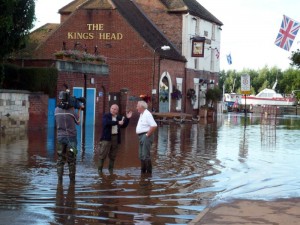Studies prove link between human activity and extreme weather events


Extreme storms and flooding will become more commonplace due to the effects of climate change that's brought on by greenhouse gases, according to two new studies published in the science journal Nature.
The first study was a cooperative effort between a climate researcher at the University of Edinburgh, and the Climate Research Division of Environment Canada. Environment Canada implements the Canadian government’s environmental agenda.
Edinburgh University researcher Gabriele Hegerl told Nature that climate models have become sophisticated enough that researchers could now attribute intense precipitation events to the Earth’s rising temperatures.
The study examines how human activity is influencing how heavy rainfall becomes in Northern Hemisphere. Researchers showed the correlation by comparing rainfall totals over the past fifty years to multiple climate models.
Discover Magazine aggregated some of the responses that the study elicited from within the scientific community. University of Reading in England scientist Richard Allan said that the paper provides the first scientific evidence that humans are causing extreme weather events.
Allan praised the study’s methods for being “very rigorous” in an interview with the Washington Post. The research is easy to comprehend: a warmer atmosphere absorbs more water; more water means more intense storms.
A second study was conducted to determine whether England and Wales would be at greater risk of historic flooding events like what happen during the year 2000. It concluded that the likelihood of another recurrence has at been at least doubled by climate change.
Its researchers are affiliated with the several departments at the University of Oxford, Institute for Atmospheric and Climate Science in Zurich, Japan’s National Institute for Environmental Studies, the UK’s national weather service, and the risk management firm RMS.
Some of the same participants published a study in 2003, "Human contribution to the European heatwave of 2003."
The scientists turned to a distributed computing project called Climateprediction.net to crunch the data for the flooding study. The project uses specialized software to power a global compute grid among a worldwide network of volunteers who donate their extra CPU cycle to climate science.
Disclosure: I work for ScaleOut Software, a company that sells middleware that can be used for grid computing.
The UK’s Guardian newspaper reported that the researchers used a whopping 40,000 years of computing time, and ran climate models thousands of times (including those simulating a world without industrial activity), to find that global warming has made future flooding far more likely to occur.
Discover Magazine cited study coauthor Myles Allen, an Oxford researcher, from an article in USA Today. Allen acknowledged that damaging weather events have been naturally occurring phenomenon, but explained that the study quantifies how rising greenhouse gas levels may be making certain weather events more likely to happen.
My own observations are not quantifiable, but it seems that summer and winter storms in the Northeast U.S. are far more intense than in the past and are getting progressively worse. The occasional flooded basement and fallen limbs at my mother’s house is now a flooding basement and several downed trees.
The past two winters have been glibly referred to “Snowmageddon,” and are also far more severe than many others that I recall during my lifetime. My 92-year-old grandfather agrees with me; although, he is a climate change skeptic.
These studies go a long way toward explaining what is happening to the climate, and I’d like to see further research for more insight into just how frequently extreme weather events will occur.
It's perfectly legitimate to debate the best way forward, but it’s high time for the politicking, paranoia, personal attacks, and cheap shots against scientists to end.
This post was originally published on Smartplanet.com